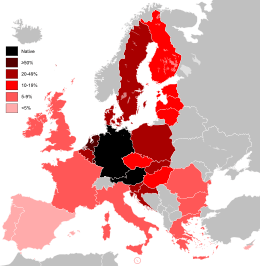German-speaking Europe

The German language is spoken in a number of countries and territories in Europe. The language is used both as an official language and as a minority language in various European countries. To cover this speech area, they are often referred to as the German speaking countries, the German speaking area (Deutscher Sprachraum), or equivalently German-speaking Europe (the few overseas territories which speak German are not commonly included in the concept).
German is the main language of approximately 95 to 100 million people in Europe, or 13.3% of all Europeans, being the second most spoken native language in Europe after Russian (with 144 million speakers), above French (with 66.5 million) and English (with 64.2 million).
The European countries with German-speaking majorities are Germany (95%, 78.3 million), Austria (89%, 7.4 million) and Switzerland (65%, 4.6 million), also known as "D-A-CH" countries. Other European countries and regions with a German-speaking majority include Liechtenstein (0.03 million), and the Italian autonomous region of South-Tyrol (0.5 million).
There is an annual meeting of the heads of state of German-speaking countries including the Presidents of Germany, Austria and Switzerland and the Hereditary Prince of Liechtenstein.[1] Since 2014 the King of Belgium and the Grand Duke of Luxembourg have also been taking part.
D-A-CH
D-A-CH or DACH is an acronym used to represent the dominant states of the German language Sprachraum. It is based on the international vehicle registration codes for:
- Germany (D for Deutschland)
- Austria (A for Austria, in German "Österreich")
- Switzerland (CH for Confoederatio Helvetica, in German "(die) Schweiz")
"Dach" is also the German word for "roof", and is used in linguistics in the term Dachsprache, which standard German arguably is in relation to some outlying dialects of German, especially in Switzerland, France, Luxembourg and Austria.
The term is sometimes extended to D-A-CH-Li, DACHL or DACH+ to include Liechtenstein. Another version is DACHS (with Dachs meaning "Badger" in German) with the inclusion of the German-speaking region of South Tyrol in Italy.[2]
DACH is also the name of an Interreg IIIA project, which focuses on crossborder cooperation in planning.[3]
Official status

| Country | Official status | Area(s) where official | Other national languages | Notes |
|---|---|---|---|---|
| Austria | National | All | — | European Charter for Regional or Minority Languages (ECRML) recognised languages are: Croatian, Hungarian, and Romani in Burgenland; Slovene in Carinthia and Styria; Czech, Hungarian, and Slovak in Vienna |
| Germany | National | All | — | ECRML recognised languages are: Danish (in Schleswig-Holstein), Upper Sorbian (in the Free State of Saxony), Lower Sorbian (in Brandenburg), North Frisian (in Schleswig-Holstein), Saterland Frisian (in Lower Saxony), Romani (across Germany), Low German (in Bremen, Hamburg, Mecklenburg-Vorpommern, Lower Saxony, Schleswig-Holstein, Brandenburg, Northrhine-Westphalia and Saxony-Anhalt) |
| Liechtenstein | National | All | — | |
| Luxembourg | National | All | French and Luxembourgish | |
| Switzerland | National, and 21 of 26 cantons | See table | French, Italian, Romansh | See German-speaking Switzerland. As well as being one of four national languages at the federal level, German is sole official language in 17 cantons; one of two official languages in 3 cantons; one of three official languages in 1 canton. |
| Belgium | 1 of 3 communities and 4 language areas | German-speaking Community and language area | French and Flemish | The German-speaking Community comprises nine of the eleven "East Cantons" that form Eupen-Malmedy |
| Italy | 1 of 100 Provinces | South Tyrol | Italian | South Tyrol is one of two provinces in Trentino-Alto Adige/Südtirol region; unlike other provinces, they are autonomous. |
| Denmark | 1 of 16 Counties | South Jutland aka North Schleswig | Danish | See North Schleswig Germans. Counties were replaced by regions in 2006, but within the Region of Southern Denmark only the area of the former South Jutland county has retained German. |
| Poland | 22 of 2,459 municipalities | 22 municipalities mainly in Upper Silesia | Polish | See German minority in Poland. One of 16 listed ECRML languages |
| Czech Republic | municipalities | Czech | See Germans in the Czech Republic. One of 4 listed ECRML languages | |
| Slovakia | Some of 2,891 municipalities | Slovak | One of 9 listed ECRML languages | |
| Hungary | Minority language | Hungarian | See Danube Swabians. One of 7 listed ECRML languages | |
| Romania | Minority language | Romanian | See Transylvanian Saxons and Banat Swabians. One of 20 listed ECRML languages | |
| Bosnia and Herzegovina | ECRML listed | Bosnian, Croatian, Serbian | One of 17 listed ECRML languages | |
| Ukraine | ECRML listed | Ukrainian | One of 13 listed ECRML languages |
German speaking minorities without official status
- High numbers of German speaking minorities, but no official recognition:
- Poland (particularly in Opole Voivodeship)
- France (Alsace and Lorraine)
- Kazakhstan
- Russia
- German speaking minorities, but no official status:
remnants of former (before WW II) substantial minorities
former German colony, outside Europe
Owing to tourism and second-home colonies some areas around the Mediterranean Sea (like the Balearic Islands) have German-speaking communities.
See also
- Austrian German
- Swiss German
- Swiss Standard German
- Alemannic German
- Swabian German
- Walser German
- Alemán Coloniero
- German-speaking Community of Belgium
- Languages in the European Union
- Germanic languages
- Germanic-speaking Europe
- English-speaking Europe
- Sprachraum
- German as a minority language
- German as a foreign language
- Benelux
- Röstigraben
References
- ↑ Meeting of German-speaking heads of state
- ↑ Example: DACHS-Projekt "Ergotherapie 2010
- ↑ "DACH+ Raumentwicklung im Grenzraum von Deutschland, Österreich, Schweiz und Liechtenstein" (in German). DACH. Retrieved 2008-03-22.
External links
- http://britishlibrary.typepad.co.uk/dach/ - DACH Blog: Blog about the British Library's German collection, and German culture, politics and literature.
